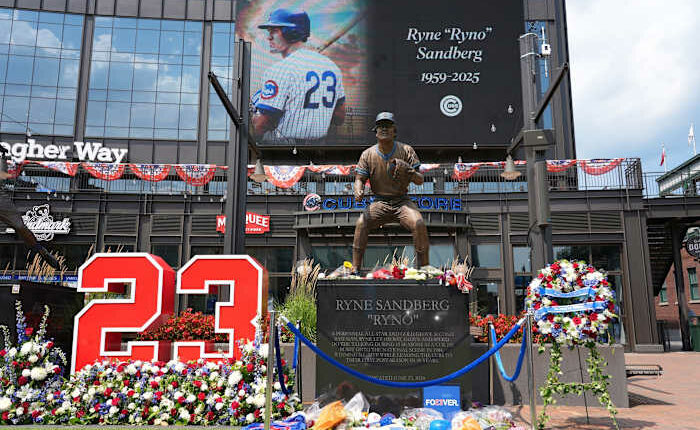Share this @internewscast.com

CHICAGO – Kevin Huigens wipes tears from his eyes as he looks at the statue of Cubs’ icon Ryne Sandberg at Chicago’s legendary Wrigley Field. The area is adorned with flowers, Cubs hats, American flags, and, naturally, baseballs at the base and on the ground.
“I believed in him,” said Huigens, 68, of nearby Berwyn. “He made being a Cubs fan enjoyable.”
Sandberg, who had cancer, died Monday.
“But he’s here in sprit, and he’s going to lift up our Cubs even if he’s not here physically,” Jessie Hill, 44, said, wearing a Cubs cap and jersey.
Social media is swamped with outpourings of love, regret and sadness at the death of Sandberg and other cherished celebrities who died this month.
Malcolm-Jamal Warner, known for his role on The Cosby Show, tragically drowned in Costa Rica on July 20 at the age of 54. Shortly after, the renowned heavy metal musician and reality TV personality Ozzy Osbourne, who had been battling Parkinson’s disease, passed away at 76. Jazz great Chuck Mangione died in his sleep on July 22, aged 84. Then, on Thursday, former wrestler Hulk Hogan, born Terry Bollea, died at 71 from cardiac arrest.
‘A loss you can share with everybody’
The quick succession of celebrity deaths serves as a poignant reminder of mortality, noted Robert Thompson, a television and pop culture professor at Syracuse University.
Thompson, 65, commented, “These individuals were central to the 1980s cultural landscape, and as they reach these later stages in life, biology takes its course. When these events occur in close proximity, their impact is magnified.”
Hogan, Warner, and Sandberg became household names as television flourished in the 1980s. Meanwhile, Mangione’s music was a fixture on smooth jazz radio from the 1970s into the 1980s.
Spanning several decades, Osbourne’s career included the 1970s, when Black Sabbath ruled the heavy metal world, through the 2000s, with the reality TV sensation “The Osbournes.”
“The silver lining about celebrities is they continue to exist for us exactly as they did before” Thompson said, because we can continue to listen to their music or watch their TV shows even after they die.
“When you lose a grandparent or an uncle it’s sad and you grieve with your family,” he continued. “But it’s a private kind of thing. When a celebrity dies, it’s a loss you can share with everybody.”
Eternal fans
Robert Livernois, 59, said he grew up an Osbourne fan. He lives in Birmingham — not the gritty city in the English Midlands where Ozzy was born and raised, but a tony city in suburban Detroit.
“I loved his music. I never subscribed to any of the theatrics,” said Livernois, a radio show host. Osbourne famously bit off the head of a bat during a live performance.
Robert West, 40, produces content for The Wrestling Shop in San Antonio. He said he lost two icons within days when Osbourne and Hogan died.
He learned of Hogan’s death through a text from a friend.
“It’s almost like the last bits of my childhood is almost gone,” West said. “I think he was part of everyone’s life.”
Hogan was a pioneer in the wrestling and entertainment industries, having a similar impact to that of Elvis Presley and Michael Jackson in music, West added.
Twenty-three-year-old Indigo Watts is a Black Sabbath and heavy metal fan who was working at Flipside Records, a store in Berkley just north of Detroit, when he learned his hero had died.
“Some guy came in and before he left he asked ‘Have you heard about Ozzy?’” Watts said. “As soon as he said, it my heart just sank.”
He said the recent celebrity deaths remind him of a dark period in 2016 when the world lost music legends Prince and David Bowie.
“I was still young, but that hit me like a truck,” Watts said. “When you’re a celebrity and you die, you leave an impact on the world.”
Copyright 2025 The Associated Press. All rights reserved. This material may not be published, broadcast, rewritten or redistributed without permission.










